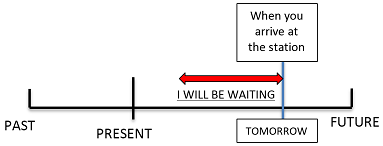Zukunft in der Verlaufsform
(Future continuous)
Einführung
Wir verwenden das Future Continuous , um eine Aktion zu beschreiben, die in der Zukunft beginnt und anhält.- When you arrive at the station tomorrow, I will be waiting at the entrance.
will be waiting = the action starts tomorrow before you arrive and continues (until you arrive).

Form
Um das Future Continuous zu bilden, verwenden wir „will be“+ die „-ing"-Form des Hauptverbs
| positiv |
I / You / We / They
He / She / It |
will be
'll be |
waiting | at the entrance. | |
| negativ |
will not be
won't be |
||||
| Frage | Will |
I / You / We / They
He / She / It |
be | at the entrance? | |
Beispiele
- Positiv:
I can't meet you next week because I will be studying.
„Lernen" ist eine kontinuierliche Tätigkeit, die nächste Woche andauern wird.
- negativ:
I won't be playing tennis this afternoon because I have a headache.
„Spielen" ist eine kontinuierliche Tätigkeit, die an diesem Nachmittag nicht andauern wird.
- Frage:
Will you be going to the cinema this weekend?
„Ins Kino gehen" ist ein kontinuierliche Tätigkeit, die an diesem Wochenende andauern könnte.
Übungen
Vervollständigen Sie die Sätze mit der positiven, negativen oder Frage-Form des Future Continuous für das Verb in Klammern:
.Weitere Übungen
Vervollständigen Sie die Sätze mit dem Present Perfect Continuous:.
Create a free Getting Started account
Related links
The following exercises include use of this grammar structure:
You might also be interested in:
- Business English vocabulary exercises
- Listening Pro account
- Reading Pro account
- Scenario-based dictation exercises – business English Pro account
- Scenario-based dictation exercises – general English
You might also be interested in:
Beginner
- Past simple
- Past continuous
- Present simple
- Present continuous (present)
- Present perfect
- 'Going to' and 'will'
- Present continuous (future)
- Imperatives
- To be
- Pronouns: subject, object
- Pronouns: relative
- Adjectives and pronouns: possessive
- Adjectives and pronouns: demonstrative
- Basic adjective word order
- WH questions (interrogative pronouns)
- Articles: a, an, the
- Prepositions: time and place
- There is/ there are and quantifiers
- Conjunctions and, or, but
- Comparatives / superlatives (than)
- Zero conditional (if)
- First conditional (if)
- Modals: can/can't, could, will, shall
- Verb patterns
- Sequence adverbs
Intermediate
- Past perfect
- Past simple vs. present perfect
- Past simple vs. past continuous
- Present perfect continuous
- Future simple
- Future continuous
- Passive
- Indirect speech
- Used to/would
- Second conditional
- Third conditional
- Relative clauses
- Reflexive pronouns
- Modals: must, have to, should, should have
- Verb patterns: gerund or infinitive
- Adverbs of degree
- Adjective order
- Adjectives: ed or ing
Grammar
Quickly identify and focus on grammar issues:
- Grammar worksheets and test
- Scenario-based grammar exercises
- Grammar additional practice questions
- Verb conjugation practice
- Conditionals practice
Improve your grammar
Vocabulary
Vocabulary exercises:Expand your vocabulary using our three vocabulary trainers:Practice your spelling using our three spelling tests:Practice vocabulary relating to graphs and charts:
Learn vocabulary
Dictation exercises
Practice your listening skills and spelling using our dictation exercises:
- Scenario-based dictation exercises - general English
- Scenario-based dictation exercises - business English
- Dictation: focus on grammar
- Numbers
Complete dictation exercises
Video lessons
Focus on specific areas of business English using our video lessons:
Take a video lesson





